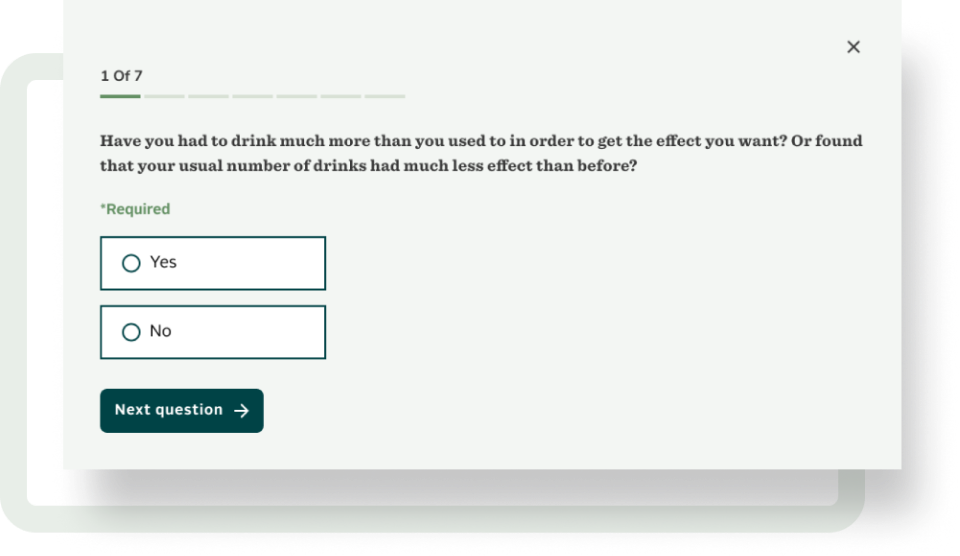These videos are sponsored by Alkermes and the participants have been compensated. The stories are personal and do not represent all people living with alcohol dependence. The opinions expressed in these videos are those of the participants alone and are not a substitute for professional medical advice. Always talk to your healthcare provider.
A Veteran's journey with alcohol dependence and recovery.
A mom's journey with alcohol dependence and recovery.
This questionnaire is not a medical diagnosis but can be used as a first step to help you think about your drinking patterns and whether there might be a cause for concern. Share these results with your healthcare provider and, together, you and your healthcare provider can determine potential next steps and, if appropriate, discuss all your treatment options. Remember, it is important to talk to your healthcare provider before making any decisions or taking action related to your health.
- Fact 1
- Fact 2
- Fact 3
- Fact 4
Ready for help?
You’ve already taken an important first step by evaluating your relationship with alcohol. If you’re ready to take the next step, there are a variety of resources available to help you on your recovery pathway.
Explore what support is right for you.
References: 1. National Institute on Alcohol Abuse and Alcoholism (NIAAA). Alcohol Use Disorder. https://www.niaaa.nih.gov/alcohols-effects-health/alcohol-use-disorder 2. National Institute on Alcohol Abuse and Alcoholism (NIAAA). Surgeon General Issues Landmark Report on Alcohol, Drugs and Health. Updated November 17, 2016. https://www.niaaa.nih.gov/news-events/news-noteworthy/surgeon-general-issues-landmark-report-alcohol-drugs-and-health 3. National Cancer Institute (NCI). Definition of Alcohol Dependence. Accessed June 15, 2023. https://www.cancer.gov/publications/dictionaries/cancer-terms/def/alcohol-dependence 4. National Institute on Alcohol Abuse and Alcoholism (NIAAA). Alcohol Use Disorder: A Comparison Between DSM-IV and DSM-5. Updated April 2021. https://www.niaaa.nih.gov/publications/brochures-and-fact-sheets/alcohol-use-disorder-comparison-between-dsm 5. National Institute on Alcohol Abuse and Alcoholism (NIAAA). Treatment for Alcohol Problems: Finding and Getting Help. https://www.niaaa.nih.gov/publications/brochures-and-fact-sheets/treatment-alcohol-problems-finding-and-getting-help 6. National Alliance on Mental Illness (NAMI) NH. Psychosocial Treatments. https://www.nami.org/About-Mental-Illness/Treatments 7. Alcohol.org. Alcohol Support Groups & Recovery Programs. Updated October 25, 2022. https://www.alcohol.org/aftercare/support-groups/ 8. Centers for Disease Control and Prevention (CDC). Morbidity and Mortality Weekly Report (MMWR). Deaths and Years of Potential Life Lost From Excessive Alcohol Use — United States, 2011-2015. Updated October 2, 2020. https://www.cdc.gov/mmwr/volumes/69/wr/mm6939a6.htm 9. Substance Abuse and Mental Health Services Administration. Drug Abuse Warning Network (DAWN): Findings from Drug-Related Emergency Department Visits, 2022. Accessed July 18, 2023. https://store.samhsa.gov/sites/default/files/pep23-07-03-001.pdf 10. National Institute on Alcohol Abuse and Alcoholism (NIAAA). Alcohol Treatment in the United States: Age Groups and Demographic Characteristics. Updated 2023. https://www.niaaa.nih.gov/alcohols-effects-health/alcohol-topics/alcohol-facts-and-statistics/alcohol-treatment-united-states-age-groups-and-demographic-characteristics




